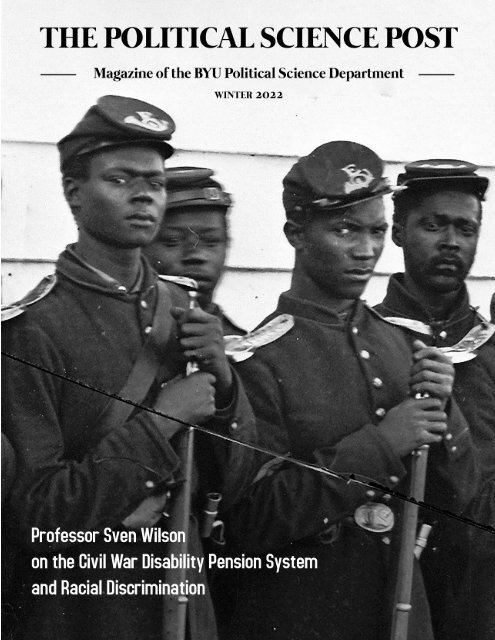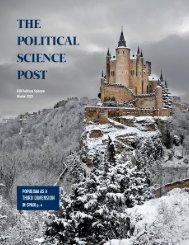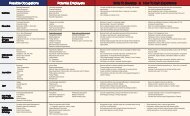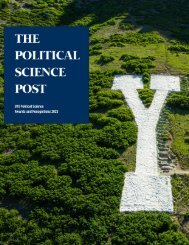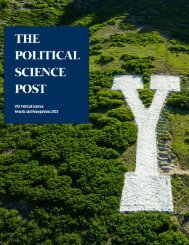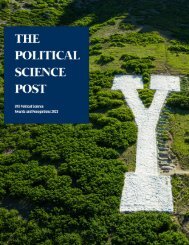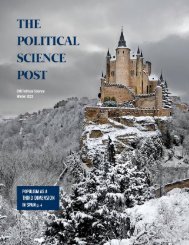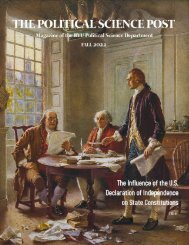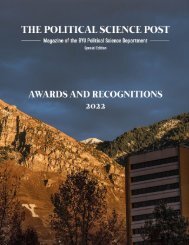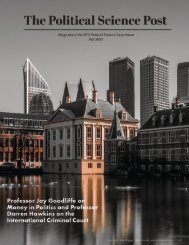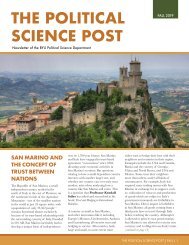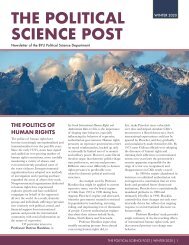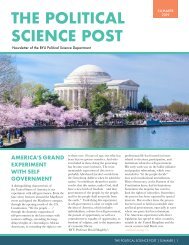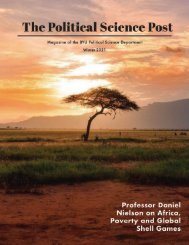PSP Winter 2022
Professor Sven Wilson on the Civil War Disability Pension System and Racial Discrimination
Professor Sven Wilson on the Civil War Disability Pension System and Racial Discrimination
You also want an ePaper? Increase the reach of your titles
YUMPU automatically turns print PDFs into web optimized ePapers that Google loves.
1
THE SYAHIM MAG<br />
CONTENTS<br />
WINTER <strong>2022</strong><br />
FOREWORD 3<br />
THE CIVIL WAR DISABILITY<br />
PENSION SYSTEM AND RACIAL<br />
DISCRIMINATION 4<br />
The BYU Department<br />
of Political Science,<br />
consistent with the aims<br />
of a BYU education,<br />
intends to foster<br />
“Lifelong Learning and<br />
Service.”<br />
We hope to provide<br />
our alumni with<br />
intelligent, thoughtful<br />
and sophisticated<br />
analysis of important<br />
issues, and to act as<br />
a catalyst for service<br />
in our communities,<br />
neighborhoods, nations<br />
and the world.<br />
EVENTS AND PROGRAMS 6<br />
POLITICAL PHILOSOPHER 14<br />
ALUMNI SPOTLIGHTS 16<br />
STUDENT SPOTLIGHTS 18<br />
FACULTY SPOTLIGHTS 20<br />
FACULTY PUBLICATIONS 24<br />
FACULTY IN THE NEWS 28<br />
GETTYSBURG ADDRESS 30<br />
Publisher:<br />
Jay Goodliffe, Chair<br />
Editor:<br />
J. Matthew Clarke<br />
2<br />
2<br />
Graphic Designer:<br />
Sydney Freeman,<br />
Abby Meyers,<br />
Seraphina Johnstun
A Lesson on Discrimination<br />
from the Civil War<br />
FOREWORD<br />
WINTER <strong>2022</strong><br />
The American Civil War began on April 12, 1861. Slavery, especially the<br />
expansion of slavery into territories acquired from the Louisiana Purchase<br />
and the Mexican-American War, was the central cause of conflict.<br />
On January 1, 1863, Abraham Lincoln issued the Emancipation<br />
Proclamation, stating that all persons held as slaves shall be forever free.<br />
Slavery was officially abolished after the North won the war on April<br />
9, 1865, and four million enslaved black people were freed. President<br />
Abraham Lincoln presided over the victory, but did not witness the<br />
continued inequality. He was assassinated on April 15, 1865 at the Fords<br />
Theater in Washington, D.C., just six days after the war ended.<br />
For many, the war ended; for black people, however, discrimination<br />
had yet to see its conclusion. This issue discusses one of the ways that<br />
discrimination continued in the Civil War Pension System, despite attempts<br />
to write a “color-blind” law, and how we might avoid such a result in the<br />
future.<br />
3<br />
3
THE SYAHIM MAG<br />
The Civil War Disability Pension System<br />
and Racial Discrimination<br />
by Sven Wilson<br />
THE UNION ARMY PENSION SYSTEM<br />
(1865-1906) was the nation’s first large-scale<br />
social insurance program. It began during the<br />
U.S. Civil War as a tightly controlled system of<br />
war-related disability compensation that, over<br />
time, developed into a general disability system<br />
and, finally, into a broad-based old-age pension<br />
for almost all Union Army veterans. Indeed,<br />
the Union Army pension dominated the federal<br />
budget and the political debates of its day to<br />
much the same extent as Social Security and<br />
Medicare do today. At the program’s peak in<br />
1893, 41.6% of all federal budget expenditures<br />
were being paid out to military veterans. This<br />
is how Dr. Sven E. Wilson’s paper, “Prejudice<br />
& Policy: Racial Discrimination in the Union<br />
Army Disability Pension System, 1865-1906,”<br />
published in the American Journal of Public<br />
Health (2010), begins.<br />
Given the ubiquitous racial discrimination<br />
in American life during this era, the de jure<br />
equality of Blacks and Whites in the disability<br />
pension system was truly remarkable. Black<br />
and White veterans were subject to the same<br />
eligibility requirements and received the same<br />
schedule of benefits. It seemed that the racial<br />
discrimination prominent in official military<br />
4<br />
4<br />
practices during the war did not carry over into<br />
the statutes and regulations governing the new<br />
pension system. But what were the de facto<br />
experiences of Blacks and Whites in the pension<br />
system? Could such a system achieve racial<br />
parity in a world where racial prejudice was so<br />
pronounced? In this study, Sven used original<br />
data sources on over 40,000 Union Army<br />
veterans to systematically compare the treatment<br />
of Black and White veterans by the pension<br />
system.<br />
The seeds of the discrimination were planted<br />
during the war. Black soldiers who were<br />
sick and injured were much less likely to be<br />
hospitalized, which left them without the<br />
documentation they later needed to prove that<br />
their disabilities were war-related. The lack of<br />
medical records, combined with other challenges<br />
Blacks faced as a result of their poverty,<br />
illiteracy, and history of enslavement, put them<br />
at a considerable and immediate disadvantage in<br />
obtaining pension support.<br />
In 1890, the law was formally liberalized<br />
to eliminate the need for wartime medical<br />
records, and the enrollment rate for Blacks<br />
increased dramatically. However, even after
1890, Blacks still faced the same difficulties<br />
as before in applying for pensions. They also<br />
faced obstacles in getting the Pension Bureau to<br />
approve their claims, particularly if they were<br />
for conditions that required a “benefit of the<br />
doubt.” Furthermore, widows and dependents<br />
of veterans also encountered discrimination<br />
in gaining pensions (although only veterans’<br />
“invalid pensions” were analyzed here). In sum,<br />
race-neutral policies gave Blacks a measure<br />
of financial assistance and dignity, but the<br />
larger potential of the pension program was<br />
systematically undermined by the systemic<br />
prejudice of human actors.<br />
Black veterans did not emerge from the Civil<br />
War with as many obvious battle injuries as their<br />
White counterparts, nor did they serve as long.<br />
Nonetheless, their service was significant, and<br />
the burdens of disease and injury they faced<br />
over the course of their lives were profound. The<br />
pension assistance received by Black veterans<br />
was a financial lifeline to them, as well as to<br />
their families and communities. But in this,<br />
as with so many other matters, Black veterans<br />
were not given their fair share. Even though<br />
the eligibility requirements were “colorblind,”<br />
Blacks, often illiterate and impoverished, faced<br />
numerous obstacles in applying for a pension.<br />
The colorblind policy experiment teaches<br />
two critical lessons. First, the law made few<br />
allowances for the obstacles that Blacks faced<br />
as a result of the conditions of their previous<br />
treatment—namely, living under slavery<br />
and the segregated, unequal treatment they<br />
received while serving their country during<br />
the war. Second, a measure of discretion and<br />
judgment is necessary and even desirable in<br />
administering any public program. A greater<br />
measure of discretion allotted to program<br />
officials inherently carries a greater opportunity<br />
for prejudice to govern the program’s outcomes.<br />
Finding the right balance between the benefits<br />
of bureaucratic discretion and the potential for<br />
abuse should be an essential aspect of program<br />
design if we desire equal treatment under the<br />
law for all citizens.<br />
5<br />
5
POLITICAL PARTICIPATION<br />
AND POLITICAL BELIEF<br />
EVENTS AND<br />
PROGRAMS<br />
POLITICAL PARTICIPATION<br />
AND POLITICAL BELIEF:<br />
HOW DOES POLITICS AFFECT<br />
OUR ATTITUDES AND<br />
RELATIONSHIPS?<br />
Thursday, Sept. 30, 2021, 5 PM in the<br />
Education in Zion Auditorium<br />
Despite being rooted in the present,<br />
American politics is about what<br />
hasn’t happened yet. And as such,<br />
politicians have to find a balance<br />
between what people need now and how policies could affect our needs in the long run. The<br />
most difficult balance to find and maintain is the equilibrium between freedom and security.<br />
Most citizens agree that politicians should not regulate speech, but other than that belief,<br />
nothing is certain except that secure democracy depends on truth.<br />
A question that has been debated time and time again is whether one party is better than the<br />
other. The received answer was that both parties are biased to some extent. We claim to be<br />
neutral, but when a position arises that could make our party look good--or make the other<br />
party look bad--we are happy to claim partisan biases and “dethrone” the other party. This<br />
abundant hostility is what makes our current day a bad time to be in politics. It also makes<br />
discovering and expressing informed opinions difficult. Critical thinking is irrelevant when<br />
one votes for a party simply to make the “other side” lose. If someone has made no effort to<br />
create an informed belief system, it is hard to talk with them about the truth.<br />
Despite the venomous nature of our current system, politics is still a way to do good. It is not<br />
the most effective way, but it is possible. Some suggestions on how to accomplish this are<br />
doing politics in a way that uplifts the debate; run in a positive way; and believe that things<br />
will get better and that the fever of negativity currently plaguing politics will pass.<br />
Though politics can do some good in the world, they cannot be a surrogate for religion.<br />
Religion should be the forefront example and most effective method of doing good; politics<br />
are a supplement for the good that can be accomplished by religion, rather than an alternative.<br />
Please be involved, Jeff Flake said at the end. We need good people to put the national good<br />
over self-interest. Let good people know they are doing good.<br />
The auditorium was filled to capacity, standing room only, and the discussion was interesting<br />
with some fun moments. Notable attendees<br />
included Senator Jeff Flake of Arizona;<br />
Cate Klundt, Government Affairs Director<br />
at the Utah Association of Realtors; and Dr.<br />
Christopher Freiman, Associate Professor of<br />
Philosophy at William and Mary. BYU Poli<br />
Sci’s Ryan Davis organized and conducted<br />
the event, which was sponsored by the<br />
Sorensen Center for Moral and Ethical<br />
Leadership.<br />
6<br />
6<br />
Thank you, Ryan, for a wonderful event.
LIEUTENANT GOVERNOR<br />
DEIDRE HENDERSON<br />
FINDING OUR "WHY," THE RETURN UTAH PRO-<br />
GRAM, AND OTHER INSIGHTS<br />
Thursday, Oct. 14, 2021, 11 AM, 250 KMBL<br />
Utah Lieutenant Governor Deidre Henderson spoke<br />
on Thursday, October 14, 2021, in the Kimball Tower<br />
on BYU campus. Her speech, which featured points<br />
on nontraditional studenthood, how she balances<br />
family and career, and more, was sponsored by the<br />
Women of the College of FHSS.<br />
Some highlights of her talk include her advice that<br />
we “Find our ‘Why’” to remind ourselves of our<br />
motivating reasons. She also advised us to not take<br />
ISSUE<br />
EVENTS AND PROGRAMS<br />
31<br />
7<br />
counsel from our fears. Many people put plans on hold for a family and then feel like an<br />
“imposter” when they recommence their lives. When asked about “Imposter Syndrome,” she<br />
responded that we should be open about how we feel, remind ourselves that our value is inherent<br />
regardless of education, and remain true to ourselves.<br />
Her greatest accomplishment, she said, was becoming a mom. She has five kids. Because of<br />
her experience reentering the workforce after a family, she started the “Return Utah” program<br />
for those returning to the workforce after life’s detours. The program, which is 16 weeks long<br />
and offers opportunities for adults returning to the workforce after an extended absence, can be<br />
found on the Utah Governor's website.<br />
When asked about her most helpful skills, Henderson responded seriously, “acting class.” Many<br />
times, we put on brave faces when all we want to do is hide. Public speaking, she said, is also a<br />
critical skill. We need to learn how to appear confident despite our fear, and learn to listen. More<br />
helpful skills included learning how to use negative feelings in a positive way, and finally, to<br />
simply pray. Faith and politics, according to her, are not hard to use together. Faith is who you<br />
are; people elect you knowing about it. It’s nothing to be ashamed of.<br />
She also reminded us that opportunities are often menial: “Opportunity is often missed because<br />
it comes dressed in overalls.” When we are focused on other things, we can unintentionally<br />
become blind to new possibilities. Her advice was to get proximate--to be open to see everything<br />
that is happening. In closing, she said we need to first find our role models, and then become role<br />
models ourselves.<br />
Thank you for an insightful presentation, Lieutenant Governor Henderson.<br />
THE SYAHIM MAG<br />
7
POLITICAL PARTICIPATION<br />
AND POLITICAL BELIEF<br />
THE BYU<br />
POLITICAL SCIENCE POSTER CONFERENCE<br />
2021<br />
EVENTS AND<br />
PROGRAMS<br />
The BYU Political Science Poster Conference occurred on December 9, from noon to 3 PM, in<br />
the Wilkinson Center Garden Court. The Conference was a success this year, highlighting the<br />
scholarship of 64 students. Experiential learning like this benefits the students, who learn how<br />
to present their ideas in the public format. The award winners and honorable mentions are listed<br />
on the next page, but everyone who participated is a winner. Thank you and congratulations.<br />
We also want to thank our two official judges, Liz McGuire and Chad Nelson, and Ryan Davis,<br />
who acted as a third unofficial judge. Thank you to all the faculty that worked with the students<br />
to produce this research. And a special thanks to Jay Goodliffe, who founded this event five<br />
years ago, and to Joel Selway, his successor, for hosting this year.<br />
8<br />
8
1 st 2 nd<br />
"Evangelical Protestants: Friend or Foe?" ($300)<br />
Ashlan Gruwell<br />
Overall Winners<br />
"Tried and Prejudice: Using Hate Crime<br />
Sentencings to Disprove the Rise of Right-Wing<br />
Terrorism in the United States" ($250)<br />
Madison Sinclair Johnson<br />
3 rd<br />
"Be Thou Sexist? Hostile & Benevolent Sexism<br />
Among Latter-day Saints" ($200)<br />
Abigail Ryan, David Clove<br />
ISSUE<br />
31<br />
9<br />
Subfield winners ($150 each):<br />
Best Comparative Paper: "How do Emigration<br />
Rates Affect the Democracy Score of the Home<br />
Country?" Elliana Pastrano<br />
Best IR Paper: "Tanks and Missiles: The Only<br />
Counterterrorism Strategy?" Peyton Lykins<br />
Best American paper: "To Guide Us in These<br />
Latter-days: When Partisans disagree with the<br />
Church's guidance" Kelsey Eyre, Jordan Gygi, and<br />
Kesley Townsend<br />
Best Race and Ethnicity Paper: "Intersectional<br />
Constituents: How Minority Elected Officials Respond<br />
to Minority Constituents." Suzy Yi<br />
Honorable mentions:<br />
“Ideologues in the Political Pipeline: Measuring<br />
the Ambition of Local Elected Officials”<br />
Grant Baldwin & Chris Vazquez<br />
“Are Supreme Court Decisions Congruent with<br />
Public Opinion on Campaign Finance?”<br />
Kesley Townsend<br />
“Polarization Through a Generational Lens”<br />
Jeremy Pratt, Clara Cullen, Hannah Forsyth<br />
“Does Clothing Make the Candidate?<br />
Identifying the Impact of Traditional Immigrant<br />
Clothing on Elections”<br />
Elle Diether, Megan Cann,<br />
and McKell McIntyre<br />
“The Failure Effect: Gender and Benevolence in<br />
Sports”<br />
Abby Woodfield, Morgan Rushforth, Meg Price,<br />
Sam Ames<br />
THE SYAHIM MAG<br />
9
MAJOR BRENT TAYLOR<br />
FOUNDATION GALA<br />
EVENTS AND<br />
PROGRAMS<br />
THE<br />
Major Brent Taylor Foundation<br />
GALA<br />
The opening reception for the Brent Taylor Leadership<br />
Legacy Gala was held on Saturday, November 6, 2021.<br />
Among the honored scholarship attendees were three<br />
BYU students: Kray Jubeck and Zeke Peters (recipients<br />
this year), and Harrison Mayer (last year). Each recipient<br />
and his wife stood next to a large poster that had their<br />
photos and information about them. Harrison and Kray<br />
were in full military dress. Our Department Chair, Dr. Jay<br />
Goodliffe, and his wife, also attended.<br />
The Major Brent Taylor foundation is a registered<br />
501(c)3 charitable organization that aims to embody the<br />
legacy of leadership that Major Brent Taylor left behind.<br />
This scholarship was established in 2021 to honor Major<br />
Brent Taylor, who was killed in action on November 3,<br />
2018 while training an Afghan Army commando battalion<br />
in Kabul, Afghanistan.<br />
Brent served as student body president at Chandler High<br />
in 1996 – 1997. He was a soldier in the Utah National<br />
Guard and the Mayor of North Ogden, Utah at the time<br />
of his combat death. The organization provides scholarships<br />
to students that show outstanding service oriented<br />
leadership. In addition to funding scholarships, the organization<br />
is committed to honoring our nation's Gold Star<br />
& Surviving Families, Veterans, and military families by<br />
funding monuments across Utah.<br />
Contributions can be sent to the the Brent and Jennie Taylor<br />
Family Endowed Scholarship Fund:<br />
LDS Philanthropies<br />
Attn: Brent Sharp<br />
1450 N. University Ave.<br />
Provo, UT. 84604<br />
10<br />
10
What's Going On in Afghanistan?<br />
Four of the BYU Political Science department's<br />
Middle East experts answered this<br />
question in a Q&A panel on Thursday,<br />
Nov. 11, 2021, at 7pm in the JFSB Education<br />
in Zion Auditorium. Professors Josh<br />
Gubler, Tyler Pack, David Romney and<br />
Chad Nelson also discussed U.S. intervention<br />
in, and the current situation of, the<br />
Afghanistan region.<br />
Among other things, one important point<br />
was that Afghanistan acted as a buffer<br />
between the British Empire and the Russian<br />
Empire for many years. The country<br />
is characterized by low levels of literacy,<br />
lack of minority rights, and 80% of the<br />
country is rural. In the metropolitan center<br />
of Kabul, women were developing rights,<br />
while in the rural areas, women have few<br />
rights. The U.S. occupation was hampered by the lack of clear goals, and most<br />
of the illiterate citizens did not know why the U.S. was there. Neither the U.S.<br />
nor any other imperial power has succeeded in building a modern Afghani<br />
state, and therefore Afghanistan is characterized by instability, which needs to<br />
be rebuilt from the inside out.<br />
ISSUE<br />
EVENTS AND PROGRAMS<br />
31<br />
11<br />
Afghanistan locals look<br />
on as Afghan National<br />
Security Forces lead a<br />
joint patrol with<br />
Coalition Forces in the<br />
village of Spine Gundey,<br />
Gelan district, Ghazni<br />
province, Afghanistan,<br />
May 10, 2012.<br />
THE SYAHIM MAG<br />
11
2021 AMERICAN<br />
FAMILY SURVEY<br />
The American Family Survey<br />
Who is most interested in marriage and having kids?<br />
EVENTS AND<br />
PROGRAMS<br />
12<br />
12<br />
HALEY AND BROOKSTON JEPPSON,<br />
29 and 27 respectively, have a 2-yearold<br />
son and welcomed a daughter in late<br />
November. She’s put her master’s degree<br />
in math education to work owning a small<br />
virtual math tutoring company. He’s currently<br />
in school full time.<br />
The Jeppsons fall into the age group most<br />
apt to believe marriage is old-fashioned or<br />
unnecessary for a family to flourish. But<br />
that’s not their view.<br />
“I think there’s a level of commitment that<br />
comes with marriage that isn’t there with<br />
cohabitation,” Haley said. “I also think that<br />
kids’ happiness and health and security<br />
comes a lot from the quality of the parents’<br />
relationship.”<br />
Americans and the institution of marriage<br />
have historically been a love story. Most<br />
American adults believe marriage is key<br />
to forging strong families. However, not<br />
all young adults share Jeppson’s faith<br />
that being legally married matters. Young<br />
adults seem less committed to the concept<br />
of marriage than they were in 2015, when<br />
the Deseret News and BYU’s Center for<br />
the Study of Elections and Democracy<br />
first teamed up to conduct the American<br />
Family Survey. The nationally representative<br />
poll conducted by YouGov looks<br />
at attitudes about family life against a<br />
background of current events.<br />
The new study exposes a growing divide<br />
when it comes to post-COVID-19 family<br />
formation. Compared to other groups,<br />
more young adults view marriage as<br />
old-fashioned and out-of-date, although<br />
more than half agree the institution makes<br />
families and children better off. In younger<br />
generations, marriage has shifted from<br />
being a cornerstone on which family life<br />
could be built to a capstone accomplished<br />
only after checking off a list of other life<br />
experiences–if one chooses to marry at<br />
all.<br />
More adults generally agreed that being<br />
legally married is less important than<br />
having a “personal sense of commitment<br />
to your partner,” nearly 48% compared to<br />
31%. But all age groups agree that marriage<br />
makes families and children better<br />
off financially, including close to half of<br />
the 18- to 29-year-olds. And more of them<br />
agree “marriage is for life, come what<br />
may,“ though in smaller shares than those<br />
of other ages.<br />
Asked if marriage is more of a burden<br />
than a benefit to families, nearly 62% disagreed<br />
at least somewhat. Among young<br />
adults 18 to 29, 51% at least somewhat<br />
disagree that marriage is a burden. How-
The American Family Survey is an annual, nationwide study of 3,000<br />
Americans by the Center for the Study of Elections and Democracy at<br />
Brigham Young University and the Deseret News.<br />
BYU Professors Jeremy Pope and Chris Karpowitz participate in and<br />
author the annual survey.<br />
ever, 17% agree– a higher percentage of<br />
agreement than among older adults, who<br />
largely feel marriage is needed to create<br />
strong families.<br />
“Among younger generations, we’re<br />
definitely seeing some important social<br />
changes,” said demographer and Institute<br />
for Family Studies research fellow<br />
Lyman Stone. “We’re seeing less attachment<br />
to marriage, and to some extent,<br />
smaller family desires.”<br />
That view of marriage is<br />
concentrated within the young adults,<br />
echoed Jeremy C. Pope, who co-directs<br />
the BYU center with Christopher F.<br />
Karpowitz. The duo co-wrote the American<br />
Family Survey report. “If you look<br />
across the young-adult spectrum, in<br />
2015, 1 in 10 said [marriage is outdated].<br />
Now it’s 2 in 10. That’s a significant<br />
jump.<br />
“I don’t want to oversell it, but there is<br />
a hint that attitudes toward marriage are<br />
changing,” Pope concluded.<br />
The 2021 American Family Survey represents the<br />
seventh annual effort from the team of experts to<br />
understand the state of public opinion about the<br />
American family and the experiences of American<br />
families.<br />
Fielded between June 25 and July 8, 2021, last<br />
year’s survey came at a relative low point in<br />
COVID cases, prior to the widespread Delta variant<br />
wave and before families sent their children back<br />
to school. Questions in the survey relate back to the<br />
American family’s experience with the pandemic<br />
and their evaluations of government responses to<br />
it, as well as 2020’s protests around the issues of<br />
racial equality and policing. The results show both<br />
challenges and resilience in the face of pandemic<br />
difficulties.<br />
The 2021 survey was released Tuesday, October<br />
12, 2021 from Washington, D.C. The margin of<br />
error is plus or minus 2 percentage points.See:<br />
https://csed.byu.edu/; and the Deseret News article<br />
by Lois M. Collins@Loisco Oct 18, 2021, for<br />
more.<br />
ISSUE<br />
EVENTS AND PROGRAMS<br />
31<br />
13<br />
THE SYAHIM MAG<br />
13
POLITICAL<br />
RALPH<br />
WALDO<br />
EMERSON<br />
14<br />
PHILOSOPHER
Ralph Waldo Emerson (May 25, 1803<br />
– April 27, 1882), was an American essayist,<br />
lecturer, philosopher, abolitionist and poet<br />
who led the transcendentalist movement of the<br />
mid-19th century. He was seen as a champion<br />
of individualism and a prescient critic of the<br />
countervailing pressures of society, and he<br />
disseminated his thoughts through dozens of<br />
published essays and more than 1,500 public<br />
lectures across the United States.<br />
A quintessential American voice, Emerson<br />
believed that civilization was only beginning<br />
and could reach unfathomable places through<br />
moral force and creative intelligence. This<br />
alone, however, is not a reason to blindly<br />
follow the footsteps before us. Remembering<br />
that “the law is only a memorandum” gave rise<br />
to Emerson’s most popular quote in this essay:<br />
“The less government we have, the better.”<br />
Emerson believed that an ideal government,<br />
aside from a nonexistent one dissolved when<br />
improvements in human character through<br />
love and wisdom could abolish the state,<br />
was one that advocated for the growth of<br />
the individual, and be able to protect one’s<br />
individual rights. The individual would<br />
only be ready for democracy when they<br />
had become completely independent and<br />
self-reliant. Then the abolishment of<br />
government could be achieved. The<br />
intelligence needed from each individual<br />
would triumph over business interests and<br />
politics, because the mind is the richest<br />
asset you can have.<br />
Emerson also questioned property rights<br />
in politics, noting that they are built not<br />
on democracy, but instead on owning.<br />
Believing that “property will always follow<br />
persons," Emerson believed personal rights<br />
were much more important than property<br />
rights.<br />
By 1844, Emerson, then 41, had moved<br />
into a pragmatic balance of skepticism<br />
and idealism, happily providing him with<br />
“a way to dream as well as a way to live.”<br />
Emerson’s views on politics championed<br />
democracy and individualism, two ideas<br />
that we view today as the very embodiment<br />
of America.<br />
See https://en.wikipedia.org/wiki/Ralph_<br />
Waldo_Emerson; Emerson, Ralph Waldo,<br />
and Ralph Waldo Emerson. 1990. Essays :<br />
First and Second Series. 1st Vintage<br />
Books/The Library of America ed. Vintage<br />
Books.<br />
ISSUE<br />
POLITICAL PHILOSOPHER<br />
31<br />
15<br />
THE SYAHIM MAG<br />
15
ALUMNI SPOTLIGHTS<br />
Bethany Linton<br />
Bethany Linton’s area of expertise is Environmental<br />
Governance. She works with the World Bank in Washington,<br />
DC as a consultant, and previously led analysis and publication<br />
of the Climate Smart Agriculture Investment Package Report<br />
for 13 countries across Africa and elsewhere. This study<br />
supports the development and piloting of a new framework<br />
for monitoring and valuing soil organic carbon sequestration.<br />
Bethany is a program manager, landscape convener, and gender<br />
analyst with a passion for collaborative and sustainable forest, landscape, and agricultural<br />
land management. Her interests lie in enhancing participatory land planning, natural resource<br />
management, and livelihood improvement through bottom-up processes.<br />
She graduated from the Yale School of Forestry and Environmental Studies with a Master’s<br />
Degree in Environmental Science, after receiving her BA in Political Science, International<br />
Development, Political Philosophy and Art History at BYU. In her undergraduate work,<br />
she participated in the BYU Political Affairs Society, Sigma, the Tocqueville Society, the<br />
Washington Seminar and worked with an NGO in Uganda.<br />
David Trichler<br />
David works with research labs and internal and external partners<br />
to bring the best of academia to current global policy challenges.<br />
His main responsibilities involve strategic planning, external<br />
engagement, and cross-cutting initiatives.<br />
Trichler served as director of operations at William & Mary’s<br />
Institute for the Theory & Practice of International Relations,<br />
where he was responsible for catalyzing applied research by<br />
faculty and students to address global challenges.<br />
Previously, Trichler worked for the Joint Chiefs of Staff, USAID, ExxonMobil Foundation,<br />
and the World Bank. He is a TedX speaker, a lucky husband to an insanely talented wife, and<br />
father of two young daughters who love dogs, cheese, and their parents, in that order. The<br />
running trails behind Lake Matoaka are his favorite place on W&M Campus. He holds an MS<br />
in Foreign Service from Georgetown University and a BA in Political Science from Brigham<br />
Young University.<br />
16
Rob Waller<br />
Rob Waller is an expert in U.S. foreign policy in the<br />
Middle East and works for the U.S. Department of State.<br />
Waller, formerly the US State Department’s Director of<br />
the Office of Iraq Affairs, has taken office as the new<br />
consul general of the United States in Erbil, the capital<br />
of Kurdistan Region. The US Consulate General in<br />
Erbil welcomed Waller in an online statement, saying<br />
that he had assumed charge of the consulate on 1st July.<br />
The statement also confirmed that Katie Kiser has been<br />
appointed as the new Deputy Principal Officer at the consulate. “Over the next few months,<br />
they look forward to exploring the rich culture of the Iraqi Kurdistan Region while also seeking<br />
out meaningful ways to collaboratively build upon our shared values of peace, security, and<br />
economic prosperity,” reads the statement.<br />
ISSUE<br />
ALUMNI SPOTLIGHTS<br />
31<br />
17<br />
A member of the Senior Foreign Service, Waller previously served as the Director of the<br />
Office of Iraq Affairs and as the Acting Deputy Assistant Secretary for Iraq and Iran.Prior to<br />
joining the Iraq office, he was Minister-Counselor for Political and Economic Affairs at the<br />
U.S. Mission to the United Nations at Geneva (2015-2018) and spent his last year there as<br />
Acting DCM. He was the U.S. Consul General in Dubai (2012-2015) and served as Director<br />
for Israeli, Palestinian and Jordanian Affairs at the NSC (2011-2012). His other overseas<br />
assignments include Paris, Baghdad, Jerusalem, FSI Tunisia, and Jeddah.<br />
Garrett Gibson<br />
Garrett Gibson has worked in various projects through his<br />
business management career. Notable companies include<br />
Panum Group, where he assisted in designing a stellar tool<br />
that further utilized space management.<br />
Garrett currently works as a senior consultant at Morgan<br />
Franklin Consulting in Washington, D.C. While working as a<br />
consultant, he leads teams to enhance operational<br />
effectiveness, execute cost-cutting strategies, and adopt new<br />
technologies to improve the efficiency of finance and procurement functions.<br />
He graduated from BYU with a bachelor's degree in PoliticalScience and Business<br />
Management, and later received his MBA from the Georgetown University McDonough<br />
School of Business.<br />
THE SYAHIM MAG<br />
17
STUDENT SPOTLIGHTS<br />
Ashlan was awarded first place and $300 at<br />
the annual Political Science Poster<br />
Conference, with a poster entitled: "Evangelical<br />
Protestants: Friend or Foe?" ($300).<br />
As a political science major, Ashlan has<br />
focused her studies on elections, sexism,<br />
and national politics, and thus her research<br />
reflects all of those interests.<br />
As a result of the research of other political<br />
scientists and religious scholars, she theorized<br />
that evangelical Protestants have a negative<br />
effect on the election of female state<br />
legislators because of the religious tradition's<br />
beliefs that a woman is not fit to lead, which<br />
led to her research question: What is the<br />
effect of a state’s percent of evangelical Protestants<br />
on the percent of females within the<br />
state’s legislature? Through her analysis, and<br />
with the help of Professor Monson, she was<br />
able to support that theory. Her results show<br />
that the percent of evangelical Protestants<br />
in a state will have a statistically significant<br />
negative effect on how many women are in<br />
ASHLAN GRUWELL<br />
First Place,<br />
2021 Political Science Poster Conference<br />
Winning Poster: "Evangelical Protestants:<br />
Friend or Foe?"<br />
that state's legislature.<br />
Outside of her school work, Ashlan<br />
volunteers in the Brigham Young<br />
University Student Association as the Director<br />
of Club Events. The BYUSA office<br />
is one of her favorite places on campus and<br />
volunteering has allowed her to meet other<br />
students, gain experience, and take part in<br />
unique activities and events.<br />
In her free time, she loves to relax with her<br />
friends and watch movies, play games, make<br />
food, and get ice cream. She also loves to<br />
listen to music at full volume, especially<br />
when she's driving her car or is home alone.<br />
She is from from Harborcreek,<br />
Pennsylvania, and is currently living in<br />
Washington D.C. as part of BYU's<br />
Washington Seminar program.<br />
18<br />
18
MADISON SINCLAIR JOHNSON<br />
Madison (Maddie) is a brand-new BYU<br />
alumna who graduated in December<br />
with a degree in political science and a<br />
minor in communications. Despite barely<br />
passing POLI 328, she loved the program<br />
and especially enjoyed all the research<br />
opportunities.<br />
Most recently, Maddie was awarded<br />
second place at the Political Science<br />
Poster Conference for her research<br />
project “Tried and Prejudice: Using Hate<br />
Crime Sentencing to Disprove the Rise<br />
of Right-Wing Terrorism in the United<br />
States.” By reasearching the Global<br />
Terrorism Database's counts of right-wing<br />
terrorism in the U.S. from 2002-2019, she<br />
found that about 70% of the 167 cases<br />
should not be classified as terrorism. At<br />
least 22% of the events were actually<br />
hate crimes, and with the solving and<br />
prosecution of more cases, it could be<br />
as high as 44%. Based on this research,<br />
while right-wing terrorism isn't truly on<br />
the rise in the U.S., hate crimes are.<br />
MEGAN BAIRD<br />
Megan is a Political Science<br />
Major who is the communications<br />
coordinator for the Political Affairs<br />
Society here at BYU. Megan<br />
is from Reston, Virginia (a few<br />
minutes outside of D.C.). She loves<br />
the outdoors; she’ll hike, climb,<br />
bike or ski. In a non-COVID world,<br />
she loves to travel. She’s made it to<br />
all 50 states!<br />
She does a lot of New York Times<br />
crossword puzzles, and has a<br />
secret talent for trivia games. As<br />
a student at BYU, she’s been able<br />
to work as a research assistant in<br />
the department. It’s been such an<br />
amazing learning opportunity!<br />
She’s also an officer in the BYU<br />
Political Affairs Society, where<br />
she runs the advertising and social<br />
media pages.<br />
ISSUE<br />
STUDENT SPOTLIGHTS<br />
31<br />
19<br />
Maddie is from Zionsville, Indiana, and<br />
now works for Ballotpedia as a News<br />
Researcher. Her interests include roller<br />
skating, house plants, and true crime.<br />
THE SYAHIM MAG<br />
19
SVEN WILSON,<br />
TYLER PACK<br />
FACULTY<br />
SPOTLIGHTS<br />
Professor Sven Wilson received a PhD<br />
in economics from the University of<br />
Chicago, and he has been in the Political<br />
Science Department at BYU since<br />
1997. He studies the demographic correlates<br />
of health over the life cycle in<br />
both modern and historical populations.<br />
He has published in a wide range of<br />
scholarly outlets on various aspects of<br />
health and social inequalities, especially<br />
with respect to race, gender and family<br />
structure. He has been a Senior Investigator<br />
on the NIA-funded program<br />
project, Early Indicators, Intergenerational<br />
Processes, and Aging, which is a<br />
data collection project based on a large<br />
sample of white and black Union Army<br />
veterans, and has published several<br />
papers based on this data.<br />
Early in in his career, Wilson published<br />
two of the seminal articles on what<br />
would come to be known as the spousal<br />
concordance in health, a topic of study<br />
that has expanded to include hundreds<br />
of published articles by both social<br />
scientists and biomedical researchers.<br />
In these oft-cited studies he shows that<br />
the health status of married persons<br />
mirrors significantly the health status<br />
of the spouse, using a variety of health<br />
indicators. Moreover, he shows that the<br />
occurrence of health problems in both<br />
spouses is highly concentrated among<br />
couples with low socioeconomic status,<br />
further compounding the economic<br />
consequences of poor health.<br />
20<br />
20<br />
Sven Wilson<br />
Expert in history,<br />
social and political sciences,<br />
and economics<br />
Wilson’s interest in social disparities in health has<br />
led to other research on social capital, including<br />
family relationships. Very little social science<br />
research has been able to follow individuals and<br />
social networks over time, so relatively little is<br />
known about the long-term persistence of human<br />
capital. Using the data on Union Army veterans,<br />
Wilson’s team demonstrated that Civil War<br />
veterans formed long-lasting social networks, as<br />
evidenced by their choice to live near Civil War<br />
comrades many years later. They also found that<br />
living near a former comrade had a beneficial<br />
effect on life expectancy.<br />
Using more modern data, Wilson’s recent research<br />
has investigated the impact of military<br />
service on participation in civic groups such as<br />
service clubs, fraternal organizations or unions.<br />
Wilson’s research finds that the veterans of major<br />
20th century conflicts participated in more groups<br />
and with greater intensity than non-veterans.<br />
Furthermore, this effect of military service is<br />
largely independent of the impact of education on<br />
civic participation.<br />
Wilson served for many years as director of the<br />
Masters in Public Policy program at BYU and<br />
was chair of the Political Science Department<br />
from 2014-2021. He currently teaches large sections<br />
of American Heritage as well as methodology<br />
and public policy courses in the department.<br />
In his spare time, Wilson enjoys downhill skiing<br />
and watching BYU Women’s Volleyball with his<br />
wife, Nancy. He and Nancy are the parents of six<br />
children and live in Provo.
Dr. Tyler Pack specializes in civil wars<br />
and ethnic conflicts, civil-military<br />
relations, and authoritarian regimes.<br />
In particular, he explores how violent<br />
conflict influences the decision making of<br />
political leaders, military elites, and the<br />
public in neighboring states.<br />
After living in five different states by<br />
the age of five, Tyler grew up in Utah,<br />
graduating from Northridge High School<br />
in 2003. He became interested in politics<br />
the traditional professor way – researching<br />
topics for high school debate. The<br />
September 11th attacks (and subsequent<br />
invasion of Afghanistan) happened when<br />
he was a junior, and the U.S. invaded Iraq<br />
three months before he graduated. U.S.<br />
military action and civil conflict were<br />
very much on his mind. While serving<br />
a mission in Russia, he observed the<br />
reaction of leaders and the public to a<br />
host of political events, including terrorist<br />
attacks carried out by Chechen separatists<br />
such as the hostage-taking and botched<br />
rescue attempt at a school in Beslan in<br />
2004.<br />
Realizing the importance of perception<br />
and exposure, as well as having a personal<br />
connection to political events, helped<br />
solidify his intentions to teach and study<br />
international relations. He received a<br />
Dr. Tyler Pack<br />
Expert in civil wars,<br />
civil-military relations,<br />
and authoritarian regimes<br />
bachelor’s and master’s degree at Utah State<br />
with a focus on Russian foreign policy. During<br />
his undergraduate work, he met his wife, and<br />
they had their first child while in Logan. They<br />
had three more children in Illinois, where<br />
Tyler attended graduate school for a PhD<br />
before coming to BYU as a visiting professor<br />
in 2019.<br />
As a teacher, Tyler’s approach focuses on<br />
frequent discussions, maximizing student<br />
engagement, exploring political events<br />
through simulations and cases, and sharing<br />
moderately dated pop culture references. At<br />
BYU he has taught Principles of International<br />
Relations, Civil Wars and Ethnic Conflict,<br />
International Intervention, and U.S. Foreign<br />
Policy.<br />
Tyler’s research focuses on the spillover<br />
effects of civil war in democratic and<br />
authoritarian regimes from World War II to the<br />
present. Some of his current projects include<br />
a study of how the unique threat environment<br />
of a nearby civil war presents a window<br />
for coup-proofing by political elites, and a<br />
project involving how individuals respond<br />
to proximate conflict with support for extraconstitutional<br />
measures by or against the<br />
regime.<br />
ISSUE<br />
31<br />
FACULTY SPOTLIGHTS<br />
21<br />
THE SYAHIM MAG<br />
21
FACULTY SPOTLIGHTS<br />
22<br />
22<br />
Gentry Jenkins is a visiting professor<br />
of Political Science who recently<br />
finished his PhD at the University<br />
of Chicago in 2020. Previously, he<br />
received an MA in International<br />
Relations from Chicago in 2014, and a<br />
BA in History from the University of<br />
Idaho in 2012.<br />
Gentry grew up in Troy, Idaho, a small<br />
town of less than 1,000 people. For<br />
the neighboring town of Moscow, his<br />
dad was the institute director of the<br />
first-ever LDS Church for the Moscow<br />
Institute of Religion. He attended<br />
the University of Idaho and majored<br />
in history, a topic he considered<br />
interesting. Gentry, along with Dr. Lisa<br />
Carlson, wrote about China’s decision<br />
to enter the Korean War despite being<br />
a new country at the time. They<br />
thought to ask: why do revolutionary<br />
states go to war?<br />
After doing a lot of research and<br />
writing, along with being denied<br />
acceptance to multiple History PhD<br />
programs, Gentry discovered that his<br />
interests in history were primarily<br />
theoretical. However, he was offered<br />
a partial scholarship in International<br />
Gentry Jenkins<br />
Expert in history,<br />
international security,<br />
revolutionary regimes,<br />
and archival research<br />
Relations at the University of Chicago.<br />
At Chicago, he worked with Robert Pape, a<br />
scholar on the logics of coercion in IR, air<br />
power, and terrorism. Professor Pape directed<br />
his Masters Thesis and PhD at Chicago. Pape<br />
has done research on the rise of territorial<br />
disputes, especially on Ethiopia’s civil war<br />
in the 1970s and 80s. Jointly, Pape and<br />
Gentry conducted research discovering that<br />
peripheral groups in Ethopia rebel against<br />
state centralization and transformational<br />
policies. Tensions exist between the Ethiopian<br />
government and its ethnic tribes: the Aromo,<br />
Emhara and Tigray specifically. Each of the<br />
tribes has cultural traits that identify them,<br />
but not necessarily their heritage, making the<br />
tension more complicated.<br />
Upon graduation from Chicago, Gentry was<br />
hired by Chicago to a two-year post doc to<br />
advise Masters students. He worked there for<br />
one year, then was invited to become a visiting<br />
professor at BYU. His research interests include<br />
international security, revolutionary regimes,<br />
civil wars, and archival research.<br />
Gentry met his wife Liz in her native Chicago;<br />
they had both been seminary teachers and had a<br />
lot in common. Now they have two daughters: a<br />
four-year-old and a nine-month-old baby.
ISSUE<br />
31<br />
23<br />
THE SYAHIM MAG
AJPS, FIRST<br />
POLITCAL ORDER<br />
How Politicians Discount the<br />
Opinions of Constituents with<br />
Whom They Disagree<br />
Daniel M. Butler, Adam M. Dynes<br />
FACULTY<br />
PUBLICATIONS<br />
We argue that politicians systematically discount the opinions of constituents with whom<br />
they disagree and that this “disagreement discounting” is a contributing factor to ideological<br />
incongruence.<br />
A pair of survey experiments, in which state and local politicians are the subjects of interest,<br />
show that public officials rationalize this behavior by assuming that constituents with<br />
opposing views are less informed about the issue. This finding applies both to well-established<br />
issues that divide the parties as well as to nonpartisan ones.<br />
Further, it can be explained by politicians’ desires to favor the opinions of either copartisans<br />
or likely voters. A third survey experiment using a sample of voters suggests that the<br />
bias toward favorable constituents is exacerbated by an activity central to representative<br />
governance—taking and explaining one's policy positions. To sum, the representative job<br />
itself can cause an increase in the likeliness to dismiss voters with dissenting opinions.<br />
24<br />
24
The First Political Order: How<br />
Sex Shapes Governance and<br />
National Security Worldwide<br />
Donna Lee Bowen<br />
Donna Lee Bowen’s new book, "The First<br />
Political Order: How Sex Shapes Governance<br />
and National Security Worldwide," has been<br />
mentioned in the Economist in two separate<br />
articles. Together, the articles use Bowen’s<br />
book to answer why societies that mistreat<br />
women are worse off than those who treat<br />
women fairly, and why foreign policy should<br />
pay more heed to half of humanity.<br />
ISSUE<br />
31<br />
FACULTY PUBLICATIONS<br />
25<br />
The following paragraphs are exerpts<br />
combined from both Economist articles.<br />
“A WOMAN WHO drives a car will be<br />
killed,” says Sheikh Hazim Muhammad<br />
al-Manshad. He says it matter-of-factly,<br />
without raising his voice. The sheikh is a<br />
decorous host. Yet the code he espouses is<br />
brutal. The social order is built around male<br />
kinship groups; the leaders are all men. At<br />
home, women are expected to obey husbands,<br />
fathers or brothers. Daughters were valued for<br />
their ability to give birth to sons. Strict rules<br />
were devised to ensure women’s chastity. If<br />
a daughter dallies with anyone other than the<br />
man chosen for her, her male kin are honourbound<br />
to kill them both.<br />
Global history records an astonishing variety<br />
of forms of social organization. Yet almost<br />
universally, males subordinate females.<br />
How does the relationship between men and<br />
women shape the wider political order? The<br />
First Political Order is a groundbreaking<br />
demonstration that the persistent and<br />
systematic subordination of women underlies<br />
all other institutions, with wide-ranging<br />
implications for global security and<br />
development.<br />
A society’s choice to subjugate women<br />
has significant negative consequences:<br />
worse governance, worse conflict, worse<br />
stability, worse economic performance,<br />
worse food security, worse health,<br />
worse demographic problems, worse<br />
environmental protection, and worse<br />
social progress. Yet despite the pervasive<br />
power of social and political structures<br />
that subordinate women, history―<br />
and the data―reveal possibilities for<br />
progress. The First Political Order shows<br />
that when steps are taken to reduce the<br />
hold of inequitable laws, customs, and<br />
practices, outcomes for all improve.<br />
https://www.economist.com/<br />
international/2021/09/11/societiesthat-treat-women-badly-are-poorerand-less-stable;<br />
https://www.<br />
economist.com/leaders/2021/09/11/<br />
why-nations-that-fail-women-fail.<br />
THE SYAHIM MAG<br />
25
FACULTY PUBLICATIONS<br />
26<br />
26<br />
America the Vincible: U.S.<br />
Foreign Policy for the<br />
Twenty-First Century<br />
Earl H. Fry, Stan A. Taylor,<br />
Robert S. Wood<br />
Taking the view that the United States is<br />
not an invincible superpower, the book<br />
America the Vincible: U.S. Foreign Policy<br />
for the Twenty-First Century focuses<br />
on changing conditions within the nation<br />
and fully examines the constitutional,<br />
political, economic, strategic, and social<br />
issues which will shape future U.S. foreign<br />
policy decisions.<br />
The authors, BYU Professors Earl H. Fry<br />
and Stan A. Taylor, are joined by Professor<br />
Robert S. Wood, who makes suggestions<br />
for changes that will produce more effective<br />
foreign policy in the coming century.<br />
Professor Wood is the holder of the Chester<br />
W. Nimitz Chair of National Security<br />
at the United States Naval War College in<br />
Newport, Rhode Island. He served in Newport<br />
as Dean of the Chief of Naval Operations<br />
Strategic Studies Group. Wood was<br />
also Dean (later, Dean Emeritus) of the<br />
Center for Naval Warfare Studies, a focal<br />
point of strategic and campaign thought<br />
in the naval services and a major research<br />
group in the national security field.<br />
Vicious Habits: Sexually<br />
Transmitted Infections among<br />
Black and White<br />
Union Army Veterans<br />
Sven Wilson et al.<br />
Sven and his collaborators (Christopher<br />
Roudiez, Heather Desomer, Coralee Lewis<br />
and Noelle Yetter) analyzed a random<br />
sample of 15,049 white veterans and 5,329<br />
black veterans of the US Civil War examined<br />
by physicians between 1890 and<br />
1906. They calculated a period prevalence<br />
of STI of 1.2–1.7% among whites and 4.2–<br />
8.0% among blacks, even though blacks<br />
and whites had almost identical prevalence<br />
of STIs in their wartime medical records.<br />
Furthermore, they found evidence that<br />
Board physicians were on the lookout for<br />
STIs among black veterans that could be<br />
used to justify denial of pension support.<br />
With or without STIs, blacks were rejected<br />
at roughly twice the rate of whites during<br />
this time period. Currently, racial disparities<br />
are even higher today than in this historical<br />
period, with blacks currently having<br />
a 5–15 times higher incidence than whites.<br />
The authors invite a critical reflection upon<br />
practices of screening and measurement<br />
systems to assess properly the degree to<br />
which racial prejudice may be part of these<br />
systems.Their article will be featured in a<br />
forthcoming publication of the Journal of<br />
Applied History.
ISSUE<br />
31<br />
27<br />
THE SYAHIM MAG<br />
27
FACULTY IN THE NEWS<br />
WEDNESDAY, JULY 21ST, 2021<br />
ON TOP OF MIND<br />
Vice President Kamala Harris is now responsible for voting rights and illegal immigration.<br />
Each responsibility is a big-ticket, divisive issue that could spell either victory or doom for<br />
her likeliness of becoming president in the future. Questions surrounding these duties and the<br />
pros and cons of the VP heading such important assignments are discussed on Top of Mind by<br />
historian Grant Madsen and political scientist Chris Karpowitz here: https://www.byuradio.<br />
org/95c1cfe9<br />
TUESDAY, AUGUST 19TH, 2021<br />
ON TOP OF MIND<br />
President Biden’s execution of removing U.S. troops from Afghanistan is what some regard<br />
as a catastrophe, citing the supplies and people he left behind. Others have the opposite view:<br />
that it was worth it, because our soldiers are now home rather than fighting a losing battle.<br />
The political consequences President Biden will face as a result of his decision, and how<br />
he will weather the storm, are discussed further with BYU professors Chris Karpowitz and<br />
Grant Madsen in this episode: https://www.byuradio.org/0d63bf6d<br />
THURSDAY, SEPTEMBER 16TH, 2021<br />
ON TOP OF MIND<br />
After Texas passed controversial law SB 8– effectively banning abortion after 6 weeks, when<br />
a fetal heartbeat is detectable– the issue of abortion is once again the hot topic for politicians<br />
across the nation. Even when compared to other issues met with similarly fiery debate, such<br />
as gun control or the death penalty, abortion seems to almost be in a category of its own.<br />
We’ve had half a century to live with Roe v. Wade, yet it hasn’t gotten any less sensational<br />
since its origin almost exactly 50 years ago.<br />
The core issue is that abortion is centered around two fundamental and very different ideas of<br />
how American freedom and responsibility are defined. Why is abortion such a major issue,<br />
and why does it matter? Regular Top of Mind guests Chris Karpowitz and Grant Madsen<br />
dissect the situation in this episode: https://www.byuradio.org/0fcc4eba<br />
28<br />
28
WEDNESDAY, SEPTEMBER 29TH, 2021<br />
ON TOP OF MIND<br />
The 2020 election saw a record voter turnout, in which 66.8% of the eligible voting<br />
population turned up at the polls. Yet, the state or city elections that occur between<br />
major elections see turnout as little as 10%.<br />
Off-year city elections provide an opening for well-organized groups to influence local<br />
policy, sometimes even against the interest of the general electorate. BYU political<br />
science professor Adam Dynes explains the reasoning, advantages, and disadvantages<br />
of off-year elections. Listen to the episode here: https://www.byuradio.org/bc769d78<br />
ISSUE<br />
31<br />
FACULTY IN THE NEWS<br />
29<br />
THURSDAY, OCTOBER 14TH, 2021<br />
ON TOP OF MIND<br />
What do children, privacy, and a whistleblower have in common? They’re all factors in<br />
Congress’s latest clash with private business: the fight against Facebook. Facebook is<br />
under fire after a whistleblower testified that its executives are not only aware of the harm<br />
Facebook is causing– whether through voter manipulation, unauthorized data collection, or<br />
its negative effects on teenagers’ mental health– but are also attempting to conceal it.<br />
Listen to regulars Chris Karpowitz and Grant Madsen describe Congress’s grievances with<br />
the social media giant, as well as what this involvement could mean for the future of media<br />
monopolies, here: https://www.byuradio.org/9bfa0106<br />
THE SYAHIM MAG<br />
29
CLOSING THOUGHT<br />
THE GETTYSBURG ADDRESS<br />
Four score and seven years ago our forefathers brought forth on this continent, a new nation,<br />
conceived in Liberty, and dedicated to the proposition that all men are created equal.<br />
Now we are engaged in a great civil war, testing whether that nation, or any nation so conceived<br />
and so dedicated, can long endure. We are met on a great battle-field of that war. We have<br />
come to dedicate a portion of that field, as a final resting place for those who here gave their<br />
lives that that nation might live. It is altogether fitting and proper that we should do this.<br />
But, in a larger sense, we can not dedicate -- we can not consecrate -- we can not hallow -- this<br />
ground. The brave men, living and dead, who struggled here, have consecrated it, far above<br />
our poor power to add or detract. The world will little note, nor long remember what we say<br />
here, but it can never forget what they did here. It is for us the living, rather, to be dedicated<br />
here to the unfinished work which they who fought here have thus far so nobly advanced.<br />
It is rather for us to be here dedicated to the great task remaining before us -- that from<br />
these honored dead we take increased devotion to that cause for which they gave the last full<br />
measure of devotion -- that we here highly resolve that these dead shall not have died in vain<br />
-- that this nation, under God, shall have a new birth of freedom -- and that government of the<br />
people, by the people, for the people, shall not perish from the earth.<br />
30<br />
30<br />
ABRAHAM LINCOLN<br />
NOVEMBER 19, 1863
ISSUE<br />
31<br />
31<br />
THE SYAHIM MAG<br />
31
32


